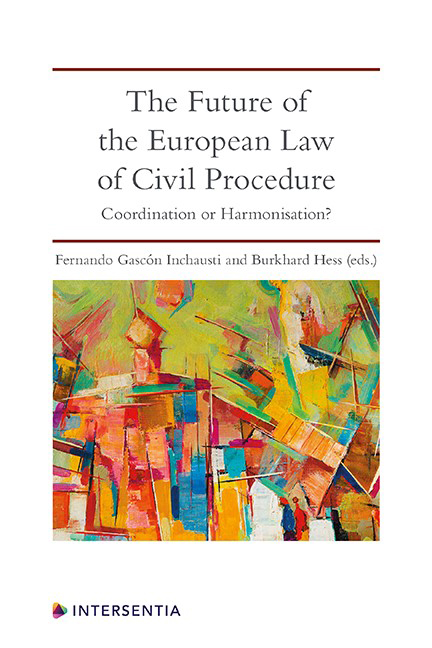Book contents
- Frontmatter
- Contents
- List of Cases
- List of Authors
- Introduction
- PART I METHODOLOGICAL APPROACHES
- PART II THE CURRENT SITUATION: VERTICAL AND HORIZONTAL HARMONISATION
- PART III CURRENT INITIATIVES FOR FURTHER HARMONISATION: The ELI/UNIDROIT Project
- The 2017 Directive Proposal on Common Minimum Standards of Civil Procedure
- Index
- ABOUT THE EDITORS
The 2017 Directive Proposal on Common Minimum Standards of Civil Procedure in the European Union
Published online by Cambridge University Press: 23 July 2020
- Frontmatter
- Contents
- List of Cases
- List of Authors
- Introduction
- PART I METHODOLOGICAL APPROACHES
- PART II THE CURRENT SITUATION: VERTICAL AND HORIZONTAL HARMONISATION
- PART III CURRENT INITIATIVES FOR FURTHER HARMONISATION: The ELI/UNIDROIT Project
- The 2017 Directive Proposal on Common Minimum Standards of Civil Procedure
- Index
- ABOUT THE EDITORS
Summary
ORIGINS AND SCOPE OF THE PROPOSAL
ORIGINS
Since the development of the well-known “Storme Project ”, there have been several indications that the EU institutions do not disregard a possible harmonisation of (some aspects of) civil procedure. The Action Plan for the implementation of the Stockholm Programme, approved in 2010, already contained the expectation that the Commission would prepare a green paper on minimum standards for civil proceedings (in 2013) and that it would formulate a legislative proposal to improve coherence of the existing legislation in the Union in the field of civil procedural law (in 2014); however, these objectives did not materialise in the foreseen terms. After the exhaustion of the Stockholm Programme, the“Strategic Guidelines for the Area of Freedom, Security and Justice ”, approved by the European Council of 26 – 27 June 2014, returned to the field of generality, without direct mention of a possible approximation of civil procedural legislation (the document refers, for instance, to“simplifying access to justice“or“improving the mutual recognition of decisions and judgments in civil matters ”, but it does include further details).
However, the issue has remained very active in the agenda of the EU institutions: various projects sponsored by the Commission have been focused on exploring the possibilities of civil procedural harmonisation; and there is an open work line in the European Parliament, which has organised meetings and commissioned studies. This work line led eventually to the resolution of the European Parliament of 4 July 2017 with recommendations to the Commission on common minimum standards of civil procedure in the European Union. This document represents an outstanding initiative in terms of harmonisation, not only because of its“official“ nature, but namely because it includes the draft text of the proposal for a Directive on common minimum standards of civil procedure in the European Union . The proposed text comprises indeed 28 articles, divided into three chapters: a first chapter on subject matter, scope and definitions (Articles 1 to 3); a second chapter establishing the minimum standards of civil procedure (Articles 4 to 24); and a third chapter with the final provisions on transposition, review and entry into force (Articles 25 to 28).
- Type
- Chapter
- Information
- The Future of the European Law of Civil ProcedureCoordination or Harmonisation?, pp. 241 - 264Publisher: IntersentiaPrint publication year: 2020



